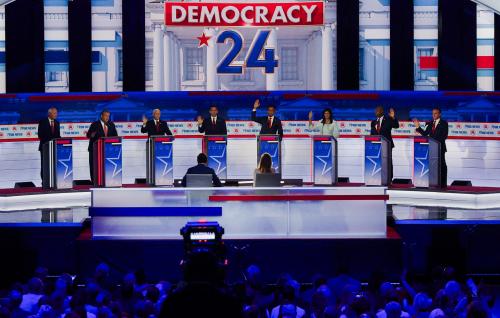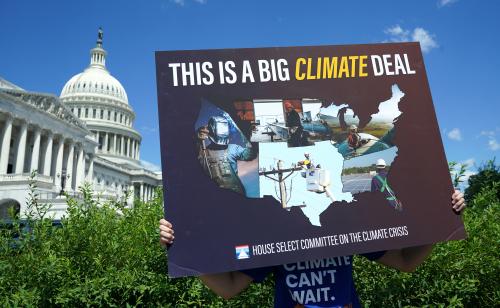

1:30 pm EST - 2:00 pm EST
Past Event
1:30 pm - 2:00 pm EST
Washington, DC
On Friday, December 11, the United States experienced unimaginable horror following the shootings at Sandy Hook Elementary in Newtown, Connecticut. In the wake of this tragedy, as the nation mourns for the victims and their loved ones, policy makers and the public are raising vital questions about how to stop this cycle of violence. What role should the government play in limiting access to dangerous weapons? What can be done to ensure Americans are receiving the mental healthcare they need? Will politicians to take meaningful action in the near future?
On December 20, John Hudak took your questions in a live web chat moderated by Andrea Drusch at POLITICO. Read a full transcript of the chat below.
1:30 Andrea Drusch: Welcome everyone, let’s get started.
1:30 John Hudak: Good afternoon: I’m glad you could all join me today for a policy discussion I wish I did not have to have. The shootings in Newtown, CT have affected all of us in an emotional way. As an American, I am appalled at what a fellow American wanted to do to a group of innocents. As a Connecticut native, I mourn with my state through one of the worst tragedies in our history.
I have written on this issue in the past week, a thought piece about the best way to go about policy making in the near term (it is available on the brookings-edu-2023.go-vip.net website), and I hope to engage this discussion in a more detailed way today. I welcome your questions.
1:30 Comment from Don: In my opinion, this is a gun control issue. If we highlight the other moving parts (mental health, etc.), do we risk weakening pressure on officials to reform gun control? That is – shouldn’t we be one united voice for one issue in the wake of this tragedy?
1:32 John Hudak: No, Don, this is precisely the problem with policy making in the US and often abroad. We address policy problems with partial solutions and then call those solutions a failure. The events of the past week, month, and past year involving these incidents must be solved through a series of steps, not a single path. We must engage all of these areas if we want policy that means improvement.
1:33 John Hudak: In fact, in terms of a pure legislative bargaining perspective, engaging other areas of policy may help gather support among other members less ready to commit on the gun issue if they see the gun issue is not taking center stage and viewed as the singular problem.
1:33 Comment from Brian: What do you think it says about our political system that it takes something this bad to provide motivation for reform?
1:35 John Hudak: I think you’re right, Brian, that it is unfortunate that we need tragedies to address problems. However, this is not something unique to our political system. As we have been reminded of stories over the past week from the UK, Australia and other countries, with dramatically different (and perhaps more efficient) political systems, they, too, often need tragedies to address policy concerns. We often see this outside of gun violence. It has been true across the world in responses to terrorism, in the improvement of disease prevention, in the testing of pharmaceuticals, and even in the growth and development of democracy.
1:35 Comment from Christine: Can you speak to the actual politics at play— what are the chances we’ll push meaningful legislation through Congress. The assault weapon ban?
1:37 John Hudak: The politics here are tough, as they’re always tough on the gun control issue. Groups are entrenched, well-funded and have access. And even if you don’t believe the NRA or other groups are as powerful as many think, they remain a power among certain segment of Congress and the broader population and are likely to influence this process. For Republicans who want to have looser gun regulations, they have a benefit on their side–the status quo. The legislative process in the US is biased toward the status quo as leg. action is difficult and faces many stages where failure is easy. 1:38 John Hudak: However, the Newtown tragedy brings a window in which action may happen. The media narrative and public opinion will render (regardless of its true power) gun rights groups to be the least powerful they have been in a long time. Similarly, it is hard to stand up against reasonable, reasoned and useful gun control regulations.
1:39 John Hudak: However, for Democrats, there are challenges, too. They need to approach this from a realistic perspective. If they try to do too much, they will do nothing. They need to understand where public opinion is, and where the preferences are within Congress and address policy options that are possible, rather than perfect.
1:40 John Hudak: Failure, in this context, is very easy. Success requires strategy and hard work. We’re in an environment where gun regulation is going to be more possible than it may ever have been, but it remains far from a sure thing.
1:40 Comment from Benjamin: What did you think of the “I Am Adam Lanza’s Mother” piece that was circulating in the days after Sandy Hook? Sure mental health plays a part in this, but ultimately we have a bigger cultural problem with guns, in my opinion. Other countries have mentally ill citizens. They don’t have as many mass shootings.
1:42 John Hudak: I think the “I Am..” piece is very powerful, and addresses a serious issue in the US that is partly related to this tragedy and one that is much larger than this tragedy. Mental Health Care in the US must be address in a more systematic and powerful way. As I wrote in my piece from Monday. Mental illness is likely to touch everyone–directly or indirectly–in their lifetime in one way or another. To blame Newtown entirely on a gun culture is extremely naive. Yes, other cultures have mentally ill citizens. However, that does not mean we cannot do a better job.
1:44 John Hudak: Across the world, access the mental health care varies. I am not saying that there is a relationship between access and decreased violence. Though that is certainly a question that I’m sure has been and/or should be explored. However, we cannot look at this as simply a guns issue. Guns play a role, surely, and policies can and should be amended to keep guns out of the hands of those most dangerous or ill. However, the mentally ill can hurt society in a variety of ways, guns, knives, bombs, etc. Newtown has shown us that guns can perpetuate horrific tragedy on us. But so does mental illness that goes untreated.
1:45 Comment from Anonymous: What policy failures have we made that allowed this to happen?
1:48 John Hudak: This is a very interesting question. By all accounts, CT’s gun laws are among the most strict in the country. The security at this school was fairly advanced. Yet, this tragedy still happened. The access to guns that can cause enormous harm in a very rapid timeframe, surely, had an effect here and access to those guns can turn problematic.
Yet, we must reconsider the access to guns–direct or indirect–that the mentally ill have as a policy concern. As we learn more about this tragedy and the situation that played out in the Lanza house, we must consider how much we allow children and those with serious illness to have access to recreational weapon usage. It is certain warning signs were there, and that people may have observed this individual using firearms, knowing he should not have. How we engage these issues will matter substantially.
1:50 John Hudak: However, we should not think only about policy failure. What in the system worked. What in the system helped stop or slow this tragedy. Surely, the system of access to the school slowed the shooter. Maybe that saved 5 or 10 lives, compared to a school that was more easily accessible. Reports suggest the individual tried to purchase a gun at an earlier date but could not. We must not only look at what failed, but what helped or was geared in the right direction.
1:50 Comment from Taylor S.: Is this a federal issue? Won’t there be concerns at the state level on mandating an overhaul on gun control?
1:52 John Hudak: Absolutely. We cannot think of this as simply a federal issue. States should and must do what they can to learn from this tragedy and others like it to strengthen gun laws, improve school safety, engage preparedness policies, and improve access to and quality of mental health care. That said, there will be states that move on these issues quickly and ones that refuse to do anything. It is in the latter that federal action is so critical. Gun violence affects every state, and every state should do more to stop it. Yet, every state will not, unless federal measures use good, sound policy and empirical evidence to change the manner in which laws protect our citizens.
1:52 Comment from Jim: Was the NRA right to stay quiet all weekend?
1:53 John Hudak: Yes. Anything the NRA says in this scenario will get examined under a microscope. Whether you think that is right or not, it was likely better for investigators to do their work and families to mourn their losses without 100 questions being asked about the “NRA reaction”
1:54 Comment From Hugh: There appear to be some obvious actions that could attract sufficiently large voting coalitions – restrictions on sales and ownership of automatic/assault weapons, large capacity magazines, and certain types of ammunition.
1:57John Hudak: This is exactly on the right track, Hugh. What gun control advocates and their supporters in Congress must think about policy changes in a discrete way with proposals that can get passed. High capacity magazines, certain specific types of guns, access limitations for those with violent histories, etc may be very “passable.” What would be absolutely wrong on this would be to try sweeping, broad, vague legislation that fails to use useful demonstrable evidence of effectiveness. It will not get passed and then the window in which real policy change is possible will close. Gun control advocates must respect the views of the other side and account for them or risk effecting no policy change.
1:57 Comment from Anonymous: Because Lanza obtained the gun from his mother, who was, arguably not mentally ill, doesn’t that simply (again) reflect a need for more overall gun control?
2:00 John Hudak: What it tells us is that we need to think of gun control as more than a purchaser-seller relationship. Gun safety starts at the point of sale, and continues into the home, into the automobile, onto the person carrying or concealing a firearm, and onto a gun range. Many of these areas and scenarios are regulated, some are not. We need to think more broadly about what can be done within homes and other areas to stop this. Perhaps regulation is not the answer. Perhaps it is an information campaign or subsidies for safe storage units or assistance and training on how best to keep weapons in a house will children or those with illness. Or perhaps regulation is best. But something must be engaged on this point to think more broadly about safety and control.
2:02 John Hudak: Thanks everyone for some great questions. This is a serious issue and I hope all of you will help assist your communities in addressing policy concerns like these and others. I also encourage you to donate to many of the causes helping to assist the victims’ families in Newtown include Newtown United Way and others. This work must continue and the people in these communities need any assistance possible.
I expect in the future, I will write more on this issue. Feel free to find these works, and ones by my colleagues at brookings-edu-2023.go-vip.net and if you would like, follow me on Twitter @JohnJHudak.
Thank you.
2:02 Andrea Drusch: Thanks everyone for your questions, see you next time.
1:30 pm - 2:00 pm
On Friday, December 11, the United States experienced unimaginable horror following the shootings at Sandy Hook Elementary in Newtown, Connecticut. In the wake of this tragedy, as the nation mourns for the victims and their loved ones, policy makers and the public are raising vital questions about how to stop this cycle of violence. What role should the government play in limiting access to dangerous weapons? What can be done to ensure Americans are receiving the mental healthcare they need? Will politicians to take meaningful action in the near future? On December 20, John Hudak took your questions in a live web chat moderated by Andrea Drusch at POLITICO.

Morley Winograd, Michael Hais, Doug Ross
August 29, 2023

Dana R. Fisher, Quinn Renaghan
July 26, 2023

Neil R. Mehrotra, Sanjay Patnaik
April 27, 2023